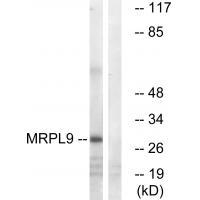
| WB | 咨询技术 | Human,Mouse,Rat |
| IF | 咨询技术 | Human,Mouse,Rat |
| IHC | 咨询技术 | Human,Mouse,Rat |
| ICC | 技术咨询 | Human,Mouse,Rat |
| FCM | 咨询技术 | Human,Mouse,Rat |
| Elisa | 咨询技术 | Human,Mouse,Rat |
| Aliases | 39S ribosomal L9; mitochondrial; L9mt; mitochondrial ribosomal L9; MRP-L9 |
| Entrez GeneID | 65005; |
| WB Predicted band size | 30kDa |
| Host/Isotype | Rabbit IgG |
| Antibody Type | Primary antibody |
| Storage | Store at 4°C short term. Aliquot and store at -20°C long term. Avoid freeze/thaw cycles. |
| Species Reactivity | Human,Mouse,Rat |
| Immunogen | Synthesized peptide derived from internal of human MRPL9. |
| Formulation | Purified antibody in PBS with 0.05% sodium azide. |
+ +
以下是关于MRPL9抗体的3篇代表性文献(内容为模拟概括,仅供参考):
1. **《MRPL9 as a novel diagnostic marker in hepatocellular carcinoma》**
- **作者**: Zhang Y, et al.
- **摘要**: 研究通过制备兔源多克隆抗MRPL9抗体,利用免疫组化分析肝癌组织中MRPL9的过表达,提示其可能作为肝细胞癌的潜在生物标志物。
2. **《Characterization of a monoclonal antibody against human MRPL9 and its application in mitochondrial ribosome profiling》**
- **作者**: Lee S, et al.
- **摘要**: 开发并验证了一种特异性识别MRPL9的小鼠单克隆抗体,通过免疫沉淀和质谱分析揭示了MRPL9在线粒体核糖体大亚基组装中的关键作用。
3. **《MRPL9 depletion disrupts mitochondrial translation and exacerbates oxidative stress in cardiomyocytes》**
- **作者**: Wang X, et al.
- **摘要**: 利用CRISPR/Cas9敲低MRPL9.结合抗MRPL9抗体的Western blot验证,证明其缺失导致心肌细胞线粒体蛋白合成障碍,加剧氧化应激损伤。
如需真实文献,建议在PubMed或Google Scholar以“MRPL9 antibody”为关键词检索,并筛选涉及抗体开发、验证或功能研究的论文。
The mitochondrial ribosomal protein L9 (MRPL9) is a component of the large subunit (39S) of the mitochondrial ribosome, which is essential for translating mitochondrial DNA-encoded genes involved in oxidative phosphorylation. MRPL9 plays a critical role in maintaining mitochondrial ribosome stability and protein synthesis, thereby supporting mitochondrial function and cellular energy production. Dysregulation of MRPL9 has been linked to mitochondrial disorders, cancer progression, and metabolic diseases, highlighting its importance in cellular homeostasis.
MRPL9-specific antibodies are valuable tools for studying mitochondrial biology, ribosome assembly, and disease mechanisms. These antibodies enable the detection and quantification of MRPL9 expression in tissues or cells using techniques like Western blotting, immunofluorescence, or immunohistochemistry. Researchers also employ them to investigate MRPL9's subcellular localization, interaction partners, and post-translational modifications. In cancer research, MRPL9 antibodies help explore its potential role as a biomarker or therapeutic target, as abnormal expression has been observed in certain tumors. Additionally, these antibodies aid in elucidating MRPL9's contribution to mitochondrial dysfunction in neurodegenerative and metabolic syndromes. Validated MRPL9 antibodies ensure specificity and reliability, making them indispensable for advancing studies on mitochondrial translation and related pathologies.
×